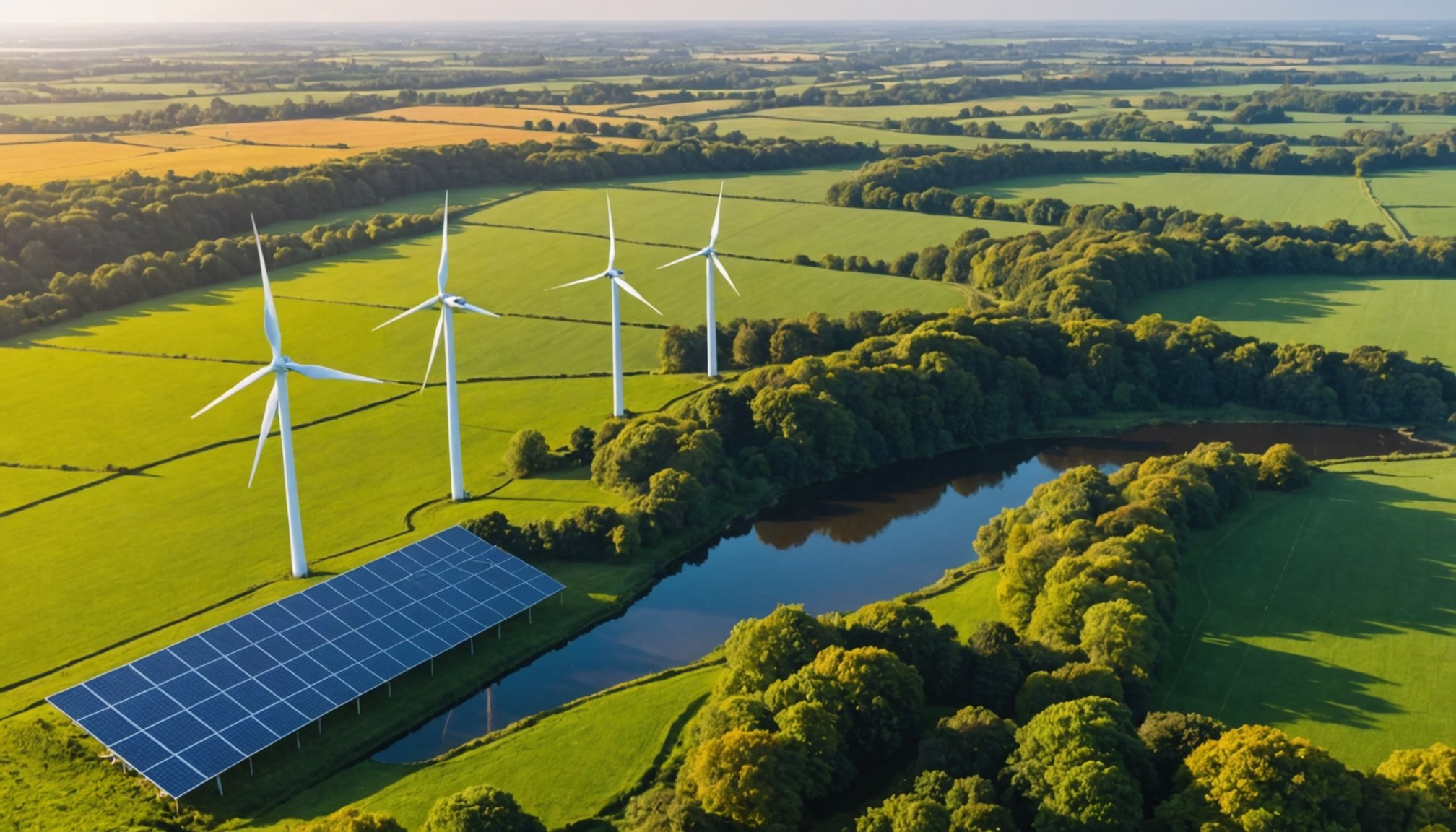Innovations in Renewable Energy Technologies
The UK is witnessing a transformative shift in renewable energy technologies, driven by innovations that enhance efficiency and sustainability. Emerging technologies, such as floating wind farms and solar panel advancements, are leading this change. These technologies allow for greater energy production with reduced environmental impact. For example, floating wind farms can be deployed in deep waters, capturing stronger winds to generate more power.
Technological advancements are not only scaling up energy production but are also integrating into the national grid with improved storage solutions like advanced batteries. These developments ensure a consistent energy supply, even when natural energy sources fluctuate. Research and development (R&D) play a crucial role in fostering such innovations, enabling continuous breakthroughs crucial for the growth of the renewable sector.
In parallel : Discover the Driving Forces Behind the Revolution in UK Clean Energy for 2024
Key success stories in the UK showcase effective technology integration. Off the Scottish coast, the Hywind Scotland project, the world’s first floating wind farm, demonstrates the potential of these technologies. Such initiatives illustrate how innovation is making renewable energy more viable and attractive to investors and policymakers.
R&D efforts continue to drive innovation, focusing on enhancing energy storage, grid integration, and minimizing costs. The continuous development of renewable energy technologies promises a more sustainable energy future for the UK, aligning with global environmental goals.
Also to discover : Discover the Driving Forces Behind the Revolution in UK Clean Energy for 2024
Overview of Renewable Energy Trends in the UK
The current state of renewable energy trends in the UK reflects a vibrant combination of robust technological advancement and supportive UK energy policy. These factors together have propelled the UK as a key player in the renewable sector. The nation’s determined push towards greener solutions has been reflected in market dynamics, which significantly contribute to the increased adoption and success of renewable initiatives.
Recent years have seen the adoption of progressive policies such as the Contracts for Difference (CfD) scheme and the Renewable Heat Incentive (RHI). These policies are designed to incentivize investment and facilitate the transition towards sustainable energy. They create an economic environment where renewable energy can thrive amidst conventional energy forms.
Market dynamics also play an essential role, reflecting UK policy and wider global trends. Diverse market players are capitalising on governmental support to innovate and invest in renewables. For instance:
- The inclusion of renewable energy in national corporate strategies.
- Increasing collaboration between public and private sectors to mitigate initial infrastructural costs.
These factors demonstrate a clear commitment to reshaping the energy landscape, fostering a thriving renewable energy market that will likely continue influencing future energy policy and market dynamics.
Government Policies and Their Impact
While discussing the UK government policies shaping the energy sector, one must recognize the significance of recent regulatory shifts in promoting renewable energy projects. Progressive policies like the Contracts for Difference (CfD) scheme have incentivized growth by minimizing financial risks for investors. Such policy analysis highlights the allure for burgeoning energy markets.
The Renewable Heat Incentive (RHI) serves as another key policy, fostering investment by subsidizing the deployment of innovative heat technologies. These incentives are pivotal for expanding the renewable sector across the nation. Given the current framework, the UK is positioned as an attractive investment hub for both domestic and international stakeholders.
It’s important to consider how Brexit has influenced these developments. While complex, Brexit has demanded an adaptation within energy regulations. Companies navigate new compliance landscapes, potentially affecting policy development and alignment with European counterparts. Adaptations in UK government policies reflect efforts to maintain a competitive energy sector.
While the policies seem robust, continuous policy analysis is crucial. The government is urged to sustain momentum in policy innovation to accommodate evolving market demands. The integration of clear regulations and incentives remains vital for reinforcing renewable transitions, ultimately aligning with broader environmental priorities.
Market Dynamics Shaping Future Trends
In the evolving landscape of renewable energy, market dynamics play a significant role in shaping future trends. As technologies advance, supply chain challenges arise, such as sourcing essential materials and components. Constraints in these areas can impede progress, but innovations and strategic planning are addressing these issues, ensuring renewable energy market dynamics remain robust.
Investment trends also illustrate a positive trajectory. Investors are increasingly recognising the potential for long-term growth within the renewable sector. This trend is bolstered by government policies that incentivize clean energy investments, such as tax breaks and subsidies. As a result, there is more substantial financial backing for renewable projects, driving innovation and technological advancements.
Influential market players, including multinational corporations and start-ups, are employing diverse strategies to capitalise on these opportunities. They are prioritising research and development and enhancing their supply chain resilience to mitigate potential risks. This approach not only supports immediate needs but also prepares for future challenges.
In conclusion, the renewable energy market dynamics in the UK are complex yet promising. The sector’s ability to adapt to challenges and leverage opportunities will determine its long-term success. The ongoing commitment from various stakeholders to foster this growth is crucial for sustainable development.
Expert Opinions on Future Prospects
Renewable energy’s trajectory in the UK has been analysed by numerous industry experts, offering valuable insights into its future. A central focus has been the anticipated technological advancements which promise to further revolutionise energy production. Experts agree that innovations such as next-generation wind turbines and cutting-edge solar technologies are pivotal for sustaining market growth.
Several industry leaders forecast potential obstacles, highlighting supply chain vulnerabilities and the need for skilled labour in a rapidly advancing sector. They advocate for strategic partnerships to mitigate these challenges, ensuring that the industry continues to thrive despite potential setbacks. A collaborative approach, involving academia, government, and private sectors, is recommended.
Looking ahead, experts predict significant growth driven by continued investment in research and development. They view government policy as a crucial enabler, stressing the importance of stable policies that incentivise further innovation and investment. This includes tax incentives and robust frameworks that support energy storage technologies, helping to balance supply and demand effectively.
Ultimately, expert opinions suggest that the UK is well-positioned to lead the renewable sector globally. The industry’s ability to navigate emerging challenges while seizing new opportunities is fundamental to maintaining its competitive edge in the ever-evolving energy landscape.
Practical Implications for Stakeholders
The renewable energy sector is a rapidly evolving landscape that offers numerous opportunities and challenges for various stakeholders. For investors and businesses, the key is understanding how to leverage these opportunities for sustainable growth. This involves staying informed about renewable energy trends and aligning business strategies with the latest developments in the UK energy policy.
Policymakers and regulators also play a significant role in shaping the future of renewable energy. By implementing forward-thinking policies and maintaining supportive regulatory frameworks, they can encourage further investment and innovation. It’s crucial for these players to anticipate market dynamics and develop agile strategies that adapt to changes within the sector.
A critical strategy for all stakeholders is collaboration. Partnerships between the public and private sectors can foster innovation and resilience, particularly in overcoming supply chain challenges. Engaging with research institutions can also accelerate technological advancements and enhance competitiveness.
Prioritising sustainability and adaptability will ensure long-term success. By understanding stakeholder implications and strategically addressing industry impact, organisations can remain competitive and resilient. Adapting to market demands while embracing renewable solutions positions stakeholders to thrive within an increasingly green energy landscape. This approach not only benefits individual entities but also contributes to a broader transition towards a sustainable future.











